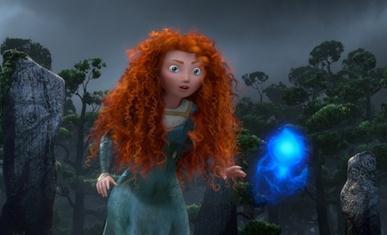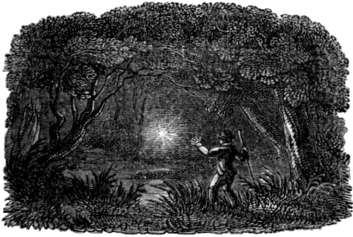| This Week’s Topic… | |

Best viewed in
|
Will-o'-the-wisps
Will-o'-the-wisps make an appearance in the Disney/Pixar film Brave (members of the Omaha Pipes and Drums played for the Omaha opening). A will-o'-the-wisp is a ghostly light seen by travellers at night, especially over bogs, swamps or marshes. It resembles a flickering lamp and is said to recede if approached, drawing travellers from the safe paths. A folk belief well attested in English folklore and in much of European folklore, the phenomenon is known by a variety of names, including jack-o'-lantern, hinkypunk, hobby lantern in English. The term "will-o'-the-wisp" comes from "wisp", a bundle of sticks or paper sometimes used as a torch, and the name "Will": thus, "Will-of-the-torch". The term jack-o'-lantern "Jack of [the] lantern" has a similar meaning. Folk belief attributes the phenomenon to fairies or elemental spirits, explicitly in the term "hobby lanterns" found in the 19th century Denham Tracts. Briggs' A Dictionary of Fairies provides an extensive list of other names for the same phenomenon, though the place where they are observed (graveyard, bogs, etc.) influences the naming considerably. When observed on graveyards, they are known as "ghost candles", also a term from the Denham Tracts. The names will-o'-the-wisp and jack-o'-lantern are explained in folk-tales, recorded in many variant forms in Ireland, Scotland, England, Wales, Appalachia, and Newfoundland. In these tales, protagonists named either Will or Jack are doomed to haunt the marshes with a light for some misdeed. One version, from Shropshire refers to Will the Smith. Will is a wicked blacksmith who is given a second chance by Saint Peter at the gates to Heaven, but leads such a bad life that he ends up being doomed to wander the Earth. The Devil provides him with a single burning coal with which to warm himself, which he then used to lure foolish travellers into the marshes.
An Irish version of the tale has a ne'er-do-well named Drunk Jack or Stingy Jack who makes a deal with the Devil, offering up his soul in exchange for payment of his pub tab. When the Devil comes to collect his due, Jack tricks him by making him climb a tree and then carving a cross underneath, preventing him from climbing down. In exchange for removing the cross, the Devil forgives Jack's debt. However, because no one as bad as Jack would ever be allowed into Heaven, Jack is forced upon his death to travel to Hell and ask for a place there. The Devil denies him entrance in revenge, but, as a boon, grants Jack an ember from the fires of Hell to light his way through the twilight world to which lost souls are forever condemned. Jack places it in a carved turnip to serve as a lantern. The will-o'-the-wisp can be found in numerous folk tales around the United Kingdom, and is often a malicious character in the stories. In Welsh folklore, it is said that the light is "fairy fire" held in the hand of a púca, or pwca, a small goblin-like fairy that mischievously leads lone travelers off the beaten path at night. As the traveler follows the púca through the marsh or bog, the fire is extinguished, leaving the man lost. In Wales the light predicts a funeral that will take place soon in the locality. A peasant traveling home at dusk spots a bright light traveling along ahead of him. Looking closer, he sees that the light is a lantern held by a "dusky little figure", which he follows for several miles. All of a sudden he finds himself standing on the edge of a vast chasm with a roaring torrent of water rushing below him. At that precise moment the lantern-carrier leaps across the gap, lifts the light high over its head, lets out a malicious laugh and blows out the light, leaving the poor peasant a long way from home, standing in pitch darkness at the edge of a precipice. This is a fairly common cautionary tale concerning the phenomenon; however, the ignis fatuus was not always considered dangerous. There are some tales told about the will-o'-the-wisp being guardians of treasure, much like the Irish leprechaun leading those brave enough to follow them to sure riches. Other stories tell of travelers getting lost in the woodland and coming upon a will-o'-the-wisp, and depending on how they treated the will-o'-the-wisp, the spirit would either get them lost further in the woods or guide them out. The Pixy-light from Devon and Cornwall is most often associated with the Pixie who often has "pixie-led" travelers away from the safe and reliable route, and into the bogs with glowing lights. "Like Poltergeist they can generate uncanny sounds. They were less serious than their German Weisse Frauen kin, frequently blowing out candles on unsuspecting courting couples or producing obscene kissing sounds, which were always misinterpreted by parents." Pixy-Light was also associated with "lambent light" which the "Old Norse" might have seen guarding their tombs. In Cornish folklore, Pixy-Light also has associations with the Colt Pixy. "A colt pixie is a pixie that has taken the shape of a horse and enjoys playing tricks such as neighing at the other horses to lead them astray". In Guernsey, the light is known as the faeu boulanger (rolling fire), and is believed to be a lost soul. On being confronted with the specter, tradition prescribes two remedies. The first is to turn one's cap or coat inside out. This has the effect of stopping the faeu boulanger in its tracks. The other solution is to stick a knife into the ground, blade up. The faeu, in an attempt to kill itself, will attack the blade. Scientifically, "marsh gas" is methane that bubbles out of marshes; this gas is contaminated with phosphine (PH3) and diphosphane (P2H4) which, when brought in contact with air, can spontaneously catch fire. This sudden burst of flame can potentially explain many will-o'-the-wisp sightings…or not. |

